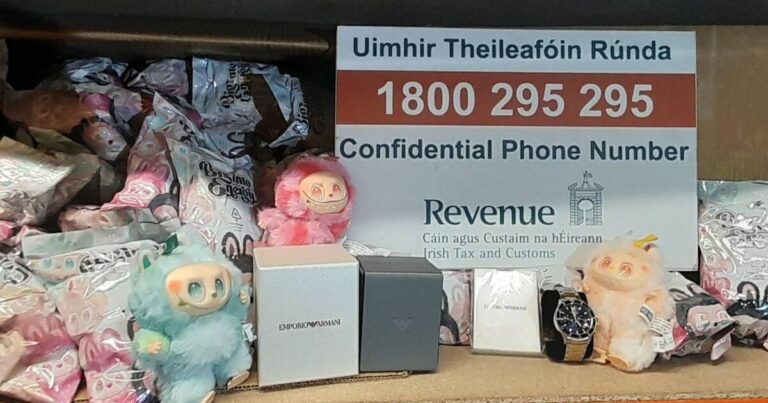The Labubu craze shows no signs of abating as new mini Labubus unveiled by Chinese toymaker Pop Mart sold out almost instantly yesterday.
The Labubu is a toothy-grinned member of “The Monsters” series of toys designed by Hong Kong illustrator Kasing Lung, What began as a niche toy obsession among young Chinese has exploded worldwide, with celebrities including Rihanna, Kim Kardashian, and David Beckham, picking up the craze, and even actor Brad Pitt and the cast of his film F1 The Movie filming a TikTok video unwrapping the toys. Indeed officials at Ireland’s Revenue seized 200 counterfeit Labubus with an estimated value of €4,000 as part of a contraband hall on Wednesday.
Yesterday’s doll release saw the release of 28 standard edition mini Labubus, which stand about 10.5cms tall and come in a variety of colours, priced at 79 yuan ($11) apiece in China but were priced at €18 in Ireland. Pop Mart said there’s a one-in-168 chance of pulling one of two special edition dolls from the unmarked boxes. The company also began sales of a larger, more premium version of the doll sold for 499 yuan (€60) but this was priced at €90 in Ireland.
Many toys are priced higher in Western markets than they are at home in China. Pop Mart can command margins of up to roughly 75% in the US, even with tariffs, Morgan Stanley said. Pop Mart’s sales will rise to $6bn (€5.1bn) in 2027, a more than 500% increase from 2023, the brokerage estimated.
In China, all available inventory was gone almost immediately after sales opened online with the traffic surge causing Pop Mart’s WeChat store page to freeze. “The popularity of the new series has already demonstrated that consumers’ enthusiasm for Labubu remains strong,” said Richard Lin, an analyst with SPDB International Holdings Ltd.
Pop Mart chief executive Wang Ning said his Beijing toy company’s revenues should find reaching revenues of 30 billion (€3.6bn) “quite easy”.
Labubu is fueling a global collectibles craze. The company posted a gross profit margin of nearly 67% last year, among the highest of Chinese firms with major international reach. By comparison, consumer electronics maker Xiaomi and EV powerhouse BYD came in around 20%.
Morgan Stanley now calls Pop Mart one of the world’s fastest-growing global brands on record, and it has a market value of about $43bn (€26m). Shares have soared 182% so far this year. Overseas sales will exceed domestic in 2025, the brokerage says.
The phenomenon marks a rare mainstream breakthrough for Chinese pop culture in Western markets, long dominated by giants like Walt Disney and Hello Kitty owner Sanrio. Pop Mart is riding the global collectibles trend fuelled by social media toy “hauls” and unboxings, while also flipping the traditional retail model: it keeps manufacturing costs low and sells mainly through its own stores, relying on a direct-to-consumer strategy that cuts out middlemen.
Collectors as well as resellers tried to get their hands on the new release. Xiaolei Wang, a 26-year-old Beijing programmer and part-time Labubu re-seller, scored one 14-box set – priced at €252 in Ireland – of the new minis on Pop Mart’s online store, but was unable to buy more as they were sold out.
“I’m going to sell the whole package. I’m not keeping Labubus for myself,” said Wang, who’s made more than €6,000 buying and reselling Labubus and other Pop Mart toys over the past year.
Pop Mart has been riding a wave of demand for the plush dolls with a toothy-grinned vinyl face, posting soaring and stronger-than-expected first half earnings earlier this month. The stock has rallied 260% this year as of Friday’s close, making its founder one of China’s youngest billionaires.
“We do not have a specific estimate on the boost to Labubu’s sales yet, but this should be positive to the overall sales of Pop Mart, particularly overseas,” Morningstar analyst Jeff Zhang said. Pop Mart launched the mini version of the toy to attract customers that focus more on phone charms and tinier accessories, he said.
The mania over Labubu dolls is reminiscent of the Beanie Baby craze in the US two decades ago. Resale prices of those beanbag toys soared in the late 1990s — exacerbated by manufacturer Ty’s policy of retiring some versions — before the collecting fad ended and demand collapsed.
Pop Mart chief executive Wang, speaking in a recent interview with Chinese state media, said that the hand-sewn complexity of the dolls limits production speed, giving rise to the scarcity that’s in part driving consumer frenzy.
Days before the official launch, resellers on second-hand trading platforms including Alibaba’s Xianyu, already offered pre-sales for the new mini Labubu products at a premium over the retail price. One reseller priced a full case of 14 mini Labubus at 2,600 yuan (€312), promising expedited delivery on Friday. That’s more than double the official retail price of 1,106 yuan for a 14-box set.
Demand is running so high that fake mini Labubus have already started to appear, according to a statement from China’s General Administration of Customs, which recently seized hundreds of knockoffs.
Bloomberg


